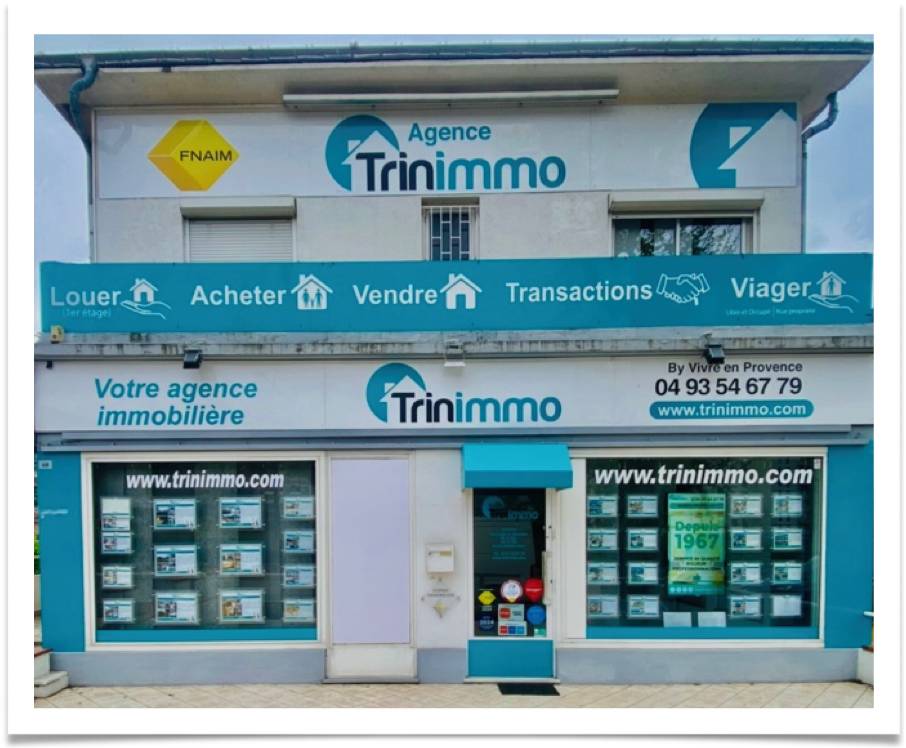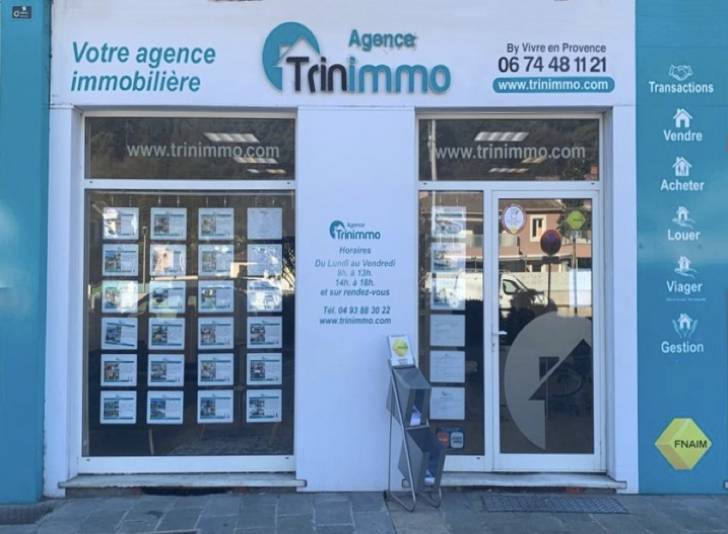
68 Boulevard Général de Gaulle
06340
La Trinité
France
The TRINIMMO estate agency, established in La Trinité since 1967, provides you with a quality service based on solid experience, rigour and attentiveness, while respecting the ethics and professionalism of the FNAIM.
We are delighted to welcome you to our 2ème branch, located in Saint André de la Roche, so that we can be as close to you as possible.
Over the years, TRINIMMO has developed a range of quality services: property transactions, rentals, rental management with rent guarantee, life annuity sales and property valuations.

68 Boulevard Général de Gaulle
06340
La Trinité
France

39 Quai de la Banquière
06730 Saint André de la Roche
France

A team of 4 experienced estate agents on a human scale, on hand to help you realise all your projects for the sale of flats, villas, building plots, commercial and professional premises.
The TRINIMMO agency undertakes to market your property by setting up, in conjunction with the seller, a detailed, scheduled marketing plan to find a buyer at the best price and as quickly as possible.

A rental manager with over 20 years' experience and her assistant are here to listen to you and help you rent flats, villas, commercial and industrial land, shops, offices and business premises.

The essentials of buying a life annuity
Life annuity: this is a form of property sale where the owner chooses to sell his or her property in return for a guaranteed annuity for life and the payment of a capital sum, known as the bouquet.
The bouquet: this is an initial capital sum paid to the seller, the amount of which is determined by agreement between the two parties, depending on the value of the property. It is not compulsory.
Annuity: this is a sum of money that the buyer pays to the seller until the seller's death.
Calculating the annuity: this is not easy, as it takes into account a number of parameters: the age and sex of the vendor, whether he or she is a single person or a couple, the estimated value of the property, the amount of the bouquet, and the existence of a right of use and habitation.
Life annuity occupancy: this accounts for the vast majority of sales, around 95%. The seller benefits from a right to live in and use the property until the end of his or her life, or until he or she moves into a retirement home.
Life annuity: this offers the buyer the opportunity to move into the property they have just bought or to rent it out.
Forward sale: this is the sale of a property where the buyer pays a lump sum in cash and monthly instalments over a defined period (payment is limited in time). In the case of an occupied forward sale, the seller may reserve a Right of Use and Dwelling (DUH).
The final cost: The final price depends on the duration of the annuity payment, which is linked to the longevity of the beneficiary. If the beneficiary dies at the estimated maturity date, the purchase price corresponds to the price of the home. If they die before the estimated maturity date, the buyer is the beneficiary. The annuity is revalued every year in line with the cost of living.
Life annuity opportunities
Life annuity sales can provide elderly people with a solution for supplementing their income at a time when pensions are falling steadily.
Advantages for the buyer
Buying a property as a life annuity means becoming the owner of a home without paying the full sale price, but instead paying an annuity to the vendor until his or her death. In this way, the buyer can build up a property portfolio for his or her own retirement. In general, the purchase of an occupied life annuity will cost 30% less than a conventional property purchase.
Advantages for the seller
They can stay in their home while receiving regular income from a very favourable tax system.
Who pays for what?
When the property is occupied, the two parties share the costs: the buyer pays the property tax and major repairs, while the seller pays the council tax, rental charges, managing agent's fees and insurance.
Where does the sale take place?
The transaction takes place before a notary and is recorded in a deed giving the property to the buyer, who pays the notary's fees and transfer taxes. The contract specifies the amount of the bouquet and the annuity, as well as all the other terms and conditions.
This site is protected by reCAPTCHA and the Google Privacy Policy and Terms of Service apply.